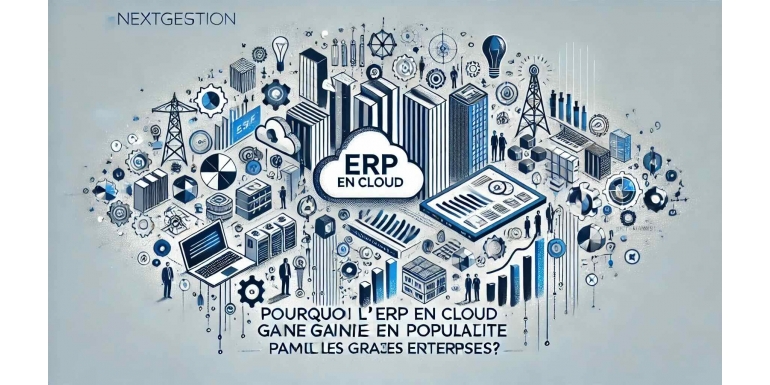
Why Cloud ERP is Gaining Popularity Among Large Enterprises
Cloud ERP (Enterprise Resource Planning) is seeing increasing adoption, particularly among large enterprises. This trend is not surprising, as cloud-based ERP solutions offer numerous advantages over traditional on-premises ERP systems. In this article, we will explore the reasons why cloud ERP is gaining popularity among large enterprises, highlighting the key benefits and best practices for its adoption.
1. Increased Flexibility and Scalability
One of the main reasons large enterprises are turning to cloud ERP is the flexibility and scalability it offers. Unlike on-premises solutions, cloud ERP allows businesses to quickly adapt to changes, whether it's adding new features, increasing the number of users, or integrating new business processes.
- On-demand scalability: Businesses can adjust the capacity of their cloud ERP based on their needs without having to invest in expensive hardware or experience prolonged downtime.
- Easy updates: Cloud service providers manage software updates, ensuring that businesses always use the latest version with the newest features and security patches.
2. Reduced Operational Costs
Cloud ERP solutions also allow large enterprises to reduce their operational costs. Adopting cloud ERP eliminates the need for significant upfront investments in hardware and infrastructure, as well as ongoing maintenance costs.
- Subscription-based pricing model: Businesses can choose pricing plans that fit their budget, with predictable costs and no surprises.
- Lower maintenance costs: With cloud ERP, the provider handles maintenance, updates, and security, reducing the costs associated with managing internal infrastructure.
3. Enhanced Security and Compliance
Data security is a priority for large enterprises, and cloud ERP solutions offer advanced security levels, often superior to those of on-premises systems. Additionally, cloud service providers invest heavily in security and regulatory compliance to protect their clients' data.
- Data encryption: Cloud ERP uses robust encryption technologies to protect data in transit and at rest.
- Compliance with standards: Cloud providers often comply with major data security and privacy standards, such as GDPR, ensuring that businesses adhere to international regulations.
4. Improved Accessibility and Mobility
Cloud ERP allows easy and secure remote access, which is particularly beneficial for large enterprises with geographically dispersed teams. Employees can access the ERP system from anywhere, anytime, and on any internet-connected device.
- Remote work: Cloud ERP supports remote work and decentralized operations, offering increased flexibility in work modes.
- Enhanced collaboration: Teams can collaborate more effectively through shared real-time data access, facilitating quick and informed decision-making.
5. Faster Deployment and Continuous Updates
Implementing a traditional on-premises ERP can be lengthy and complex, whereas cloud ERP allows for faster deployment. Additionally, updates are continuous, enabling businesses to immediately benefit from the latest features and improvements.
- Quick deployment: Cloud ERP solutions can be deployed in a matter of weeks, or even days, compared to the months required for on-premises solutions.
- Continuous improvements: Automatic updates ensure that businesses always have the latest tools to optimize their operations.
6. Better Integration and Interoperability
Cloud ERP solutions are designed to integrate easily with other systems and applications, allowing for seamless interoperability between different management tools.
- APIs and integrations: Cloud ERP often provides robust APIs and pre-built integrations with third-party software, simplifying the integration of existing systems.
- Partner ecosystem: Large enterprises can benefit from a vast ecosystem of partners and add-ons to extend the functionality of their ERP.
7. Innovation and Competitive Advantage
Finally, cloud ERP enables large enterprises to stay at the forefront of innovation. With access to new technologies and advanced features, businesses can improve their competitiveness in the market.
- Artificial intelligence and analytics: Many cloud ERP solutions integrate AI and advanced analytics tools to provide valuable insights and automate processes.
- Adaptability: Businesses can quickly adopt new technologies, such as AI, machine learning, or IoT, to maintain their competitive edge.
Conclusion
Cloud ERP is gaining popularity among large enterprises for obvious reasons: flexibility, cost reduction, enhanced security, accessibility, rapid deployment, easy integration, and competitive advantages. By adopting a cloud ERP solution, large enterprises can not only optimize their operations but also prepare for future challenges in the global market.
